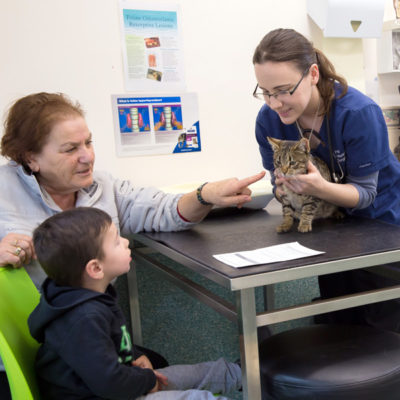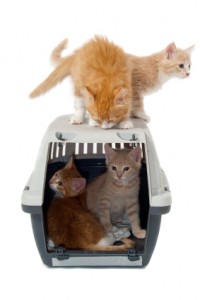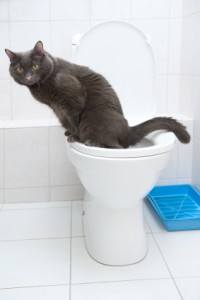Regular check-ups are vital in ensuring that our cats live healthy and happy lives. Unfortunately many Cats and their owners find visits to the vet can be quite stressful. There are lots of things we can do to make the vet visit more comfortable for our cats. It really doesn’t have to be a stressful experience.

1. Get a good Cat Carrier
A Cat Carrier is not only the safest way to transport your cat in the car, it can also be a safe haven for your cat during your vet visit. The best carriers have both a top and front opening. One like the picture below is fantastic, it is sturdy and secure and the lid clicks off making it easy to get your cat in and out of the carrier. Most of the examination can even be performed within the carrier to help reduce stress.

2. Get your cat used to the carrier
Some cats only ever go in their carrier to be taken to the vet so it is natural for them to relate the carrier to the entire experience. This can leave them feeling frightened of the carrier itself, some owners even report that their cats hide as soon as they even bring the carrier out. It is very important that we make sure our cats know that their carrier is a safe and happy place, you can do this by:
- Leaving the carrier out at home, so it becomes a familiar and less scary.
- Feeding your cat their breakfast or dinner inside the carrier.
- Placing treats and toys in the carrier so your cat gets used to going in and out.
3. Make the carrier a nice place to be
Using Feliway spray in the carrier will help reduce anxiety associated with travel. Ask us for more details on Feliway.

Place soft bedding in the bottom of the carrier, this will help prevent you cat from slipping and sliding around during travel. Using bedding or an item of clothing that has your scent on it will make your cat feel more comfortable and secure. Covering the carrier with a towel during transport creates a safe hiding place.
4. Make sure the carrier is safe
In the car, ensure that carrier will not slide around or be jolted by bumpy roads. Securing it with a seat belt will help. Once you get to the clinic place the carrier up off the ground, as being on ground level can make cats feel vulnerable and scared. If possible, try to sit in a quieter area of the waiting room away from dogs and noise. If you don’t have a towel of your own please ask one of our friendly customer care staff who will place a Feliway sprayed towel over your cats carrier whilst you wait to be seen by the vet.
5. Talk to us
If you are still finding it challenging to bring your cat to the vet, give us a call so we can discuss ways of making it less stressful.
Call us now on (02) 6230 2223 to book you cats next check up or book online now by heading back to the HOME PAGE.

 Like people, many pets suffer from forms of anxiety. If your pet cannot settle during thunderstorms or fireworks or perhaps your pet cannot settle if you are not present, then talk with Dr Helen Purdam about some strategies to help the both of you cope.
Like people, many pets suffer from forms of anxiety. If your pet cannot settle during thunderstorms or fireworks or perhaps your pet cannot settle if you are not present, then talk with Dr Helen Purdam about some strategies to help the both of you cope.

